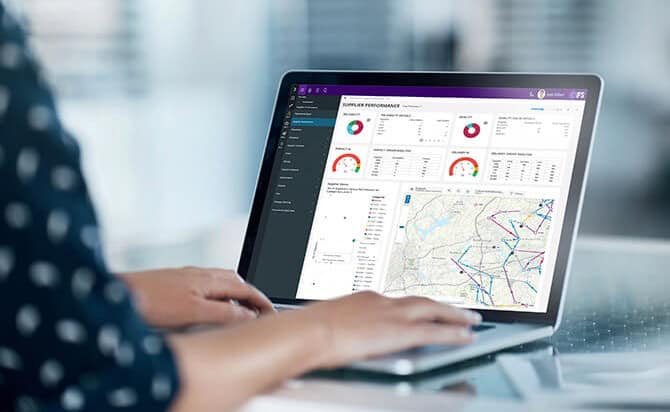Service Management software or technology is the tool that enables businesses to manage these processes to their fullest potential. But what is Service Management software?
For us, it’s simple: Field Service Management software is a tool that allows businesses to track, record, and optimize their field operations and service processes.
At IFS, we know that service can take many forms, whether it be field service, depot repairs, on-site maintenance, or dealer network assistance. Managing those processes with the right mix of software, hardware, and business decisions are key to the success of many modern enterprises.
Transform Field Service Management
Our FSM Solution will:
– Minimize repetitive and paper-based tasks
– Transition your business from products towards service-oriented functions
– Catalog, manage, and optimize the schedules for service technicians and field workers
– Develop detailed and complex plans for service parts management
– Start building business plans around outcomes-based service
Integrated solutions for the challengers in A&D Manufacturing
What Is Field Service Management?
The bread and butter of Service Management, true service firms require Field Service Management software to function correctly. Field Service Management software is the utility that powers the delivery of service appointments—from informing systems about service-level agreement requirements, through appointment delivery, and including warranty and contract management.
Here are some of the key capabilities of field operations management:
– Service ticket management
– Pricing and billing
– SLA management
– Warranty management
– Performance management
– Knowledge management
– Repair management
– Asset management
– Mobile Field Service
– Contact Center and Customer Engagement
What Is Planning And Scheduling Optimization?
Back office processes are changing at a dramatic rate for businesses of all sizes. Organizations are seeking to minimize repetitive processes, limit the number of branch offices, and ensure that the bulk of resources focus on the delivery of service. For businesses of all sizes, smart software has been the tool that has allowed them to bridge the gap. Contact Center and Customer Engagement software focuses on first-touch customer interactions, back office processes, and the ongoing cultivation of customer relationships.
Here are some of the key capabilities of Contact Center and Customer Engagement:
What Is Contact Center And Customer Engagement Software?
Back office processes are changing at a dramatic rate for businesses of all sizes. Organizations are seeking to minimize repetitive processes, limit the number of branch offices, and ensure that the bulk of resources focus on the delivery of service. For businesses of all sizes, smart software has been the tool that has allowed them to bridge the gap. Contact Center and Customer Engagement software focuses on first-touch customer interactions, back office processes, and the ongoing cultivation of customer relationships.
Here are some of the key capabilities of Contact Center and Customer Engagement:
What Is Parts And Repair Management Software?
A key, but overlooked component of service delivery is ensuring that technicians arrive on-site with the right parts, are able to quickly manage repairs and returns, and that the whole of these applications can work in harmony with one another. Parts and Repair Management software allows businesses to catalog the locations and stock of service parts, and manage incoming and outgoing supply chain, depot activities, and third party stock utilization.
Here are some of the key capabilities of Parts and Repair Management:
FIELD SERVICE MANAGEMENT FAQ’S
What Makes Service Management Software Any Good?
Best-in-class service software combines the power of automation with a fundamental understanding of how operations function at your business. At IFS, we strive not just to provide the best software, but also the strongest domain expertise of any service platform. That combination means that we understand your business, and build our systems to contour to your unique needs.
And that’s part of the challenge with defining service management software. Service functions for businesses are often so complex, diverse, tribalistic and disconnected that getting a piece of software that fits around all the flailing tendrils of your business is not as easy as installing a new piece of project management software. Many companies, especially those new to service who are seeing the revenue potential of service for their business, build products with feature sets as basic as their other applications. This requires businesses to shove their service processes into a pre-built mold, which always means that you have to saw off elements of your service delivery plan (sometimes entrenched with years of experience) to compromise to software limitations, or invest in even more products to get back to square one.
Because of this, service management vendors that simply have a long list of capabilities, even if those capabilities look particularly flashy in a demo environment, need to be held up to greater scrutiny. Will this parts management system work for the multiple tiers of service appointments that I deal with? Does this crew management system allow me to manage my workers the way that they actually work, or does it just throw names into a list? Does this optimization software manage the scope of global appointments that my company much have oversight for?
Learn more about how IFS FSM software is used:

IFS Expands regional office in Singapore: Global EBITA doubles in H1 2019, Revenue guidance up 21% to 711M USD
New IFS management’s partner-focus strategy and “Challenger” value proposition accelerates IFS performance within a year, outperforming the global plan to be a 1Bn USD revenue company in 3 years. Singapore’s IFS regional headquarter poised to achieve highest growth, relocating to Suntec Tower 2 with 25% headcount increment across APJMEA and new senior management appointments to…

การผลิตที่เชื่อมต่อกัน (Connected Manufacturing)
การผลิตที่เชื่อมต่อกัน (Connected Manufacturing) คือ วิวัฒนาการในการเพิ่มประสิทธิภาพกระบวนการในอุตสาหกรรมการผลิต

IFS Supply Chain
การจัดการห่วงโซ่อุปทาน (Supply Chain) ถือได้ว่าเป็นหัวใจหนึ่งในการลดต้นทุนขององค์กร โดย Supply Chain

IFS Project
องค์กรบริหารงานโครงการมักจะมองหาซอฟต์แวร์ ERP ที่ออกแบบมาเพื่อการจัดการโครงการโดยเฉพาะแบบครบวงจร ตั้งแต่การวางแผนงาน

IFS Financials
ระบบ IFS Financials สามารถทำงานร่วมกับโมดูลอื่นๆในระบบ IFS เช่น ระบบ Supply Chain ระบบ HR หรือระบบการผลิต

แนวโน้มการผลิตในปี 2025 สู่การท้าทายของเทคโนโลยี AI, ความยั่งยืน และนวัตกรรม
อุตสาหกรรมการผลิตทั่วโลกอยู่ในช่วงหัวเลี้ยวหัวต่อสำคัญที่กำลังเข้าสู่ปี 2025 ความก้าวหน้าทางเทคโนโลยีอย่างรวดเร็ว

ISO/IEC 29110 คืออะไรและมีความสำคัญอย่างไร
มาตรฐาน ISO/IEC 29110 คือ มาตรฐานสากลที่ถูกออกแบบมาเพื่อช่วยเหลือผู้ประกอบการขนาดเล็กและขนาดย่อม